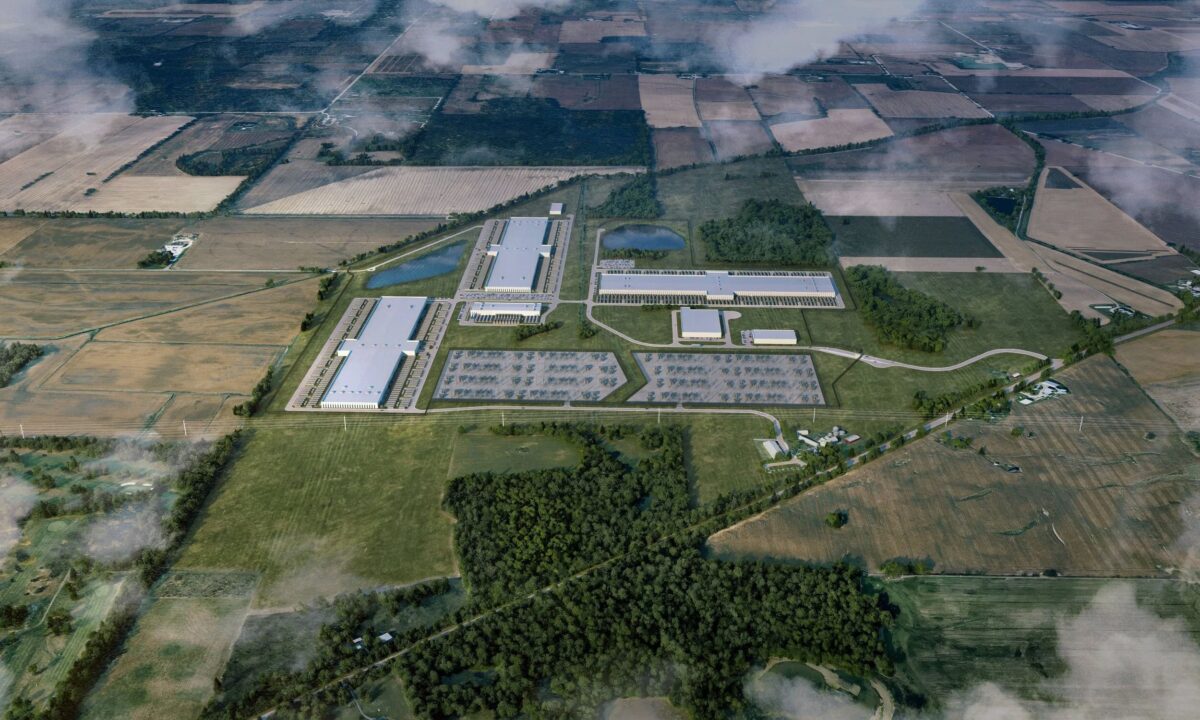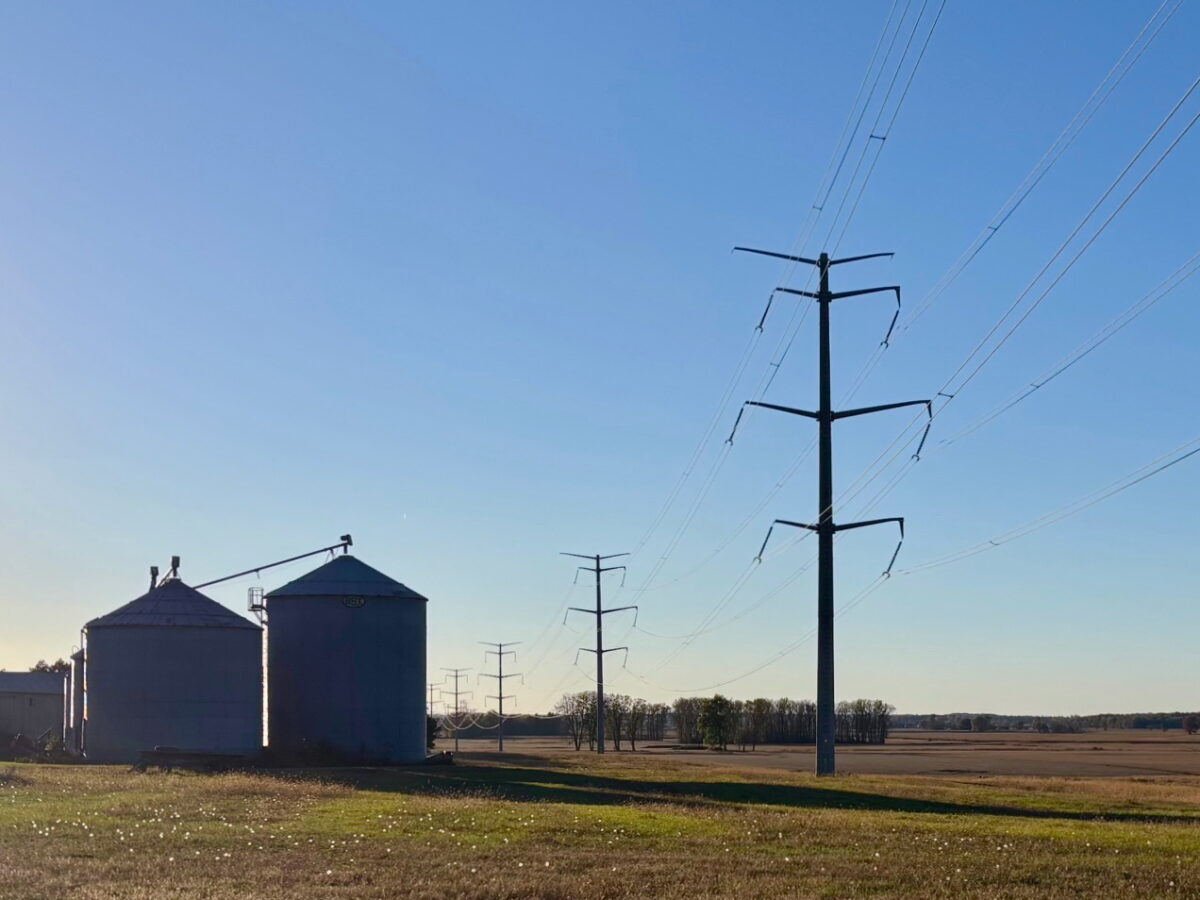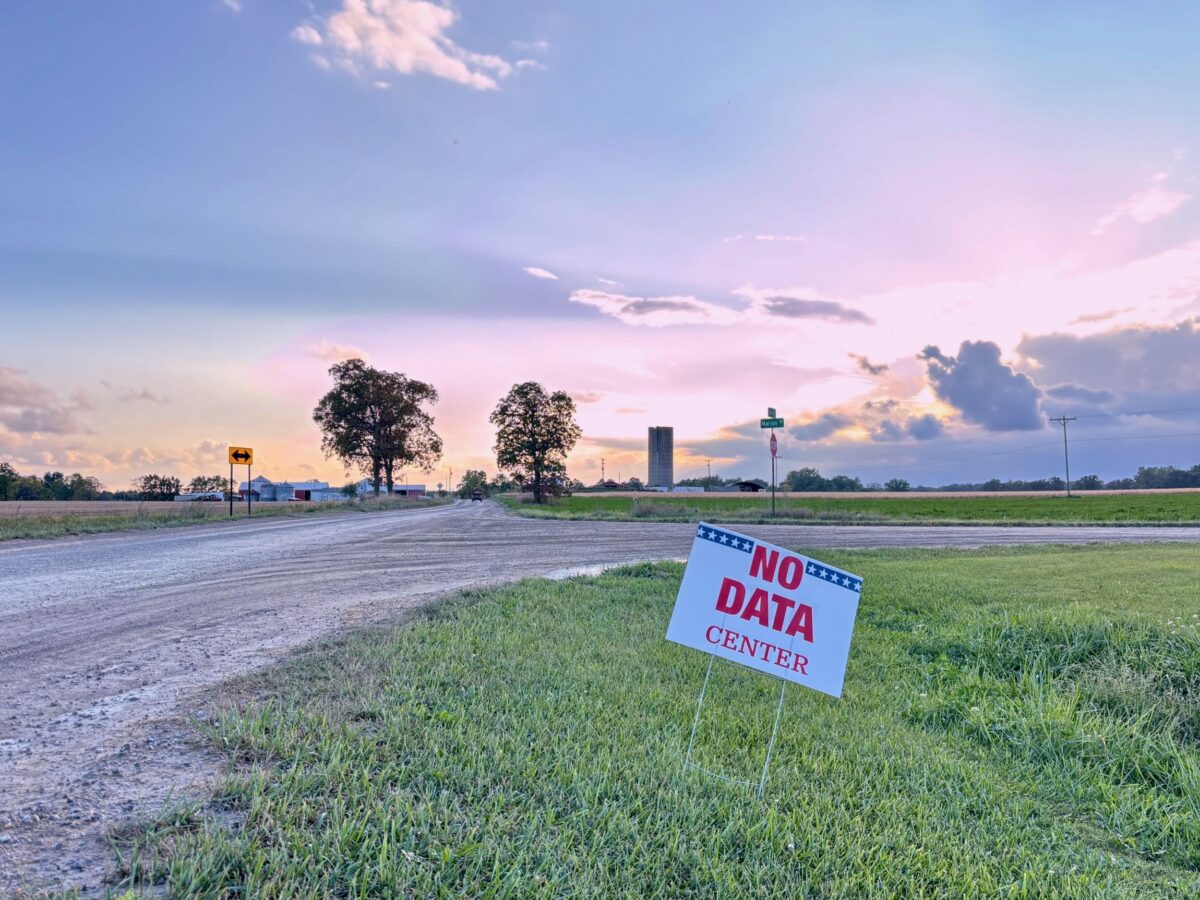Overview:
- Three tech giants announced Thursday their plans to build a massive data center in Saline Township.
- Utilities announced additional deals in the works as new tax breaks lure the industry to Michigan.
- Proponents see economic opportunity, while opponents fear energy and climate drawbacks.
by KELLY HOUSE and PAULA GARDNER
Bridge Michigan
This story was originally published by Bridge Michigan, a nonprofit and nonpartisan news organization. To get regular coverage from Bridge Michigan, sign up for a free Bridge Michigan newsletter here.
Michigan is poised to receive its first hyperscale data center after three tech giants revealed themselves Thursday as the developers behind a proposed 1-gigawatt-plus AI project on farmland in Saline Township.
The news that OpenAI, Oracle and Related Digital will build the massive computing facility for their Stargate joint venture comes hours after officials with DTE Energy, the utility serving the Saline area, announced on a quarterly earnings call that the company had inked a deal to provide 1.4 gigawatts of power to an unnamed data center project. DTE Spokesman Ryan Lowry confirmed Thursday afternoon that the project is the Saline Township campus.
Construction is slated to begin in 2026. The Wall Street Journal reported its value will top $7 billion.
“I’m grateful to these cutting-edge companies for betting on Michigan, building on our work to compete for and win big projects in next-generation industries from cars and clean energy to semiconductors and batteries,” Gov. Gretchen Whitmer said in a statement.
Whitmer hailed the deal as “the largest economic project in Michigan history,” saying it will create more than 450 onsite jobs, plus additional spinoff jobs in Washtenaw County. In 2022, General Motors announced a $7 billion investment across two factories, promising 4,000 workers.
The data center proposal has drawn its fair share of pushback.
After the Saline Township board voted last month against rezoning the 575-acre site for the data center, Related Digital successfully sued, accusing the township of exclusionary zoning.
A settlement in that case last week, combined with the DTE deal to provide power, paved the way for Thursday’s public announcement.
The township’s supervisor and attorney did not immediately respond to messages left by Bridge Michigan on Thursday.
Township Planning Commissioner Ronald Kohler told Bridge Michigan that he originally voted against the proposal, but has grown more comfortable since developers agreed to invest some $14 million to the local community and make concessions such as on-site groundwater level monitoring wells.
“I really think once it’s in there, you won’t even know what’s there,” he said. “You can’t live in the horse and buggy days no more.”
The deal will be eligible for a sales and use tax exemption on equipment, a subsidy approved by the Legislature in late 2024. The companies also will seek a 12-year, 50% local tax abatement, according to the court settlement.
House Speaker Matt Hall, R-Richland Township, noted Thursday that he voted against the data center tax breaks that have prompted a wave of interest from the tech industry. He said he’d like to see economic development officials get more upfront buy-in on projects with the potential to reshape communities.
“The battery plants come in, and the public don’t want them, and we’re starting to see that on the data centers, too,” he said.
Yet the deal could signal more opportunity for Michigan during a period of rapidly changing technology, said Phil Santer, chief operating officer of Ann Arbor SPARK economic developers.
After working on the Saline Township project and visiting others in the U.S., “we’re thinking about where this can go toward an overall AI strategy for the state,” Santer told Bridge. “A data center of this scale in our backyard just adds to our assets.”
A press release from the three companies stated that the data center campus would occupy 250 acres of the site with three buildings of 550,000 square feet apiece. The campus will use a closed-loop system to cool servers, which company officials claimed will limit the site’s water use “to levels comparable to an office building.”
“This project will help ensure Michigan is a key part of building the AI infrastructure that will power the next generation of American innovation,” said Peter Hoeschele, an OpenAI vice president .
DTE, Consumers negotiate data centers deals
The announcement comes hours after Michigan’s two largest utilities both announced new progress in the tech industry’s quest to build massive data centers in Michigan, which so far has none of the hyperscale facilities owned by tech giants like OpenAI, Google and Microsoft.
Providing power to the announced facility will increase DTE’s power demand by roughly 25% — a sharp uptick that company officials plan to fulfill using excess capacity on DTE’s grid, plus a $2 billion battery facility paid for by the developers.
DTE President and CEO Joi Harris called the news “an exciting milestone” for the company while touting it as an opportunity to create “substantial affordability benefits for existing customers.”
Beyond the Stargate campus, DTE is in late-stage negotiations for another 3 gigawatts’ worth of data center capacity, Harris said during a Thursday earnings call.
Officials with Consumers Energy, meanwhile, announced they’re nearing completion of deals for three large data centers amounting to a collective 2 gigawatts of power — about double the near-term demand Consumers projected back in August, when it announced a deal with a single data center developer for up to 1 gigawatt of power.
Consumers has not shared details about the locations of those proposed data centers or the companies involved. But Microsoft has already announced the purchase of two sites in Allegan and Kent Counties, located in Consumers territory.
Additional data center interest has emerged from the Howell area to the rural outskirts of Ann Arbor, Monroe and Kalamazoo.
The fast-and-furious dealmaking comes after Michigan lawmakers authorized new tax breaks meant to entice big tech companies to build in Michigan amid a global data center boom.
Proponents tout the multi-billion-dollar facilities as a way to bring new investment and tax revenue to Michigan. Although the state’s new law exempts eligible data centers from the state’s 6% sales and use tax, local taxes can amount to millions of dollars a year for each facility.
Opponents, however, fear the facilities will overtax Michigan’s energy grid, raise utility rates and negatively transform the rural farming communities that tend to attract data centers because of their abundance of cheap undeveloped land.
“How many do we need, and how close together should they be?” asked Regina Kudla, a resident of the Ypsilanti area, where the University of Michigan and Los Alamos National Laboratory are pursuing a $1.2 billion project.
Kudla said she is concerned that the facilities’ water and energy use could overtax supplies.
A deal after others fell apart
While Whitmer touted the data center announcement, the investment comes after several blows to her administration’s economic development strategy in recent months. They include Sandisk pulling out of a megasite deal near Flint that was estimated to be worth $63 billion, or nine times the cost of the Saline Township project.
In addition, the Legislature defunded a large-scale incentive fund that fueled $2 billion in subsidies.
The Related Companies are well-known in Washtenaw County for developments and record-setting donations to the University of Michigan. The Stephen M. Ross School of Business is named for the Related founder and chairman. In addition to donations supporting athletics, Ross also is a funder of the U-M innovation campus under construction in Detroit.
On Tuesday, privately held OpenAI and Oracle (NYSE: ORCL) announced another Stargate development in Milwaukee valued at $15 billion and developed by Vantage Data Centers.
MORE DATA CENTER NEWS
Saline Township settles with data center developer: ‘Lesser of two evils’
Facing a lawsuit from landowners and data center developer, Saline Township opts for a settlement that earmarks funding for the community.
Consumers Energy case sheds light on how Michigan data centers could hike your power bill
Michigan regulators are considering a Consumers Energy case that could indicate how the state plans to protect residential customers from potential price hikes caused by power-hungry data centers.
Attorneys sketch out Saline Township’s options in data center fight
Threat of monetary damages adds to risk for rural township fighting data center.
Michigan utilities prepare for data centers
The massive hyperscale data centers built by the likes of Google, Meta and Microsoft tend to occupy hundreds of acres apiece, gobbling up as much energy as a midsized or even large city. Depending how costs are apportioned for that new demand, it could bring affordability for everyone by spreading the cost of maintaining poles, wires and power plants among more customers, or it could raise rates if data center developers aren’t made to pay for the potential billions of dollars’ worth of investments needed to connect them to the grid.
Utilities are balancing excitement about the money to be made expanding their business with concerns that the predicted data center boom could fail to materialize, leaving ratepayers holding the bill for that infrastructure build-out.
In a rate case filed with state energy regulators, Consumers has proposed establishing special rules that would require data center operators to sign 15-year contracts that guarantee consistent electricity use and impose steep exit fees on data center operators that downsize or cease operations mid-contract.
The goal, Consumers Director of Cost and Pricing Laura Connolly said in a regulatory filing, is to ensure that massive investments meant to accommodate data centers don’t wind up raising rates for everyday power customers.
Beyond questions about costs, environmentalists are worried utilities will falter in their efforts to get off fossil fuels as data centers prompt a rapid increase in power usage.
Indeed, both DTE and Consumers say their long-term plans to absorb data center load involve building new fossil fuel power plants.
Consumers Energy President and CEO Garrick Rochow said Thursday that the utility will file a long-term power plan with state regulators next year detailing plans for “both battery capacity and natural gas capacity.”
“The more we add, in terms of data centers, that will continue to grow,” Rochow said.
DTE officials, meanwhile, announced Thursday that they intend to build a gas plant in the coming years to offset lost power generation from the Monroe coal plant slated to go offline in 2032.
But both utilities contend they can make those fossil fuel investments while still complying with the state’s climate law, which requires them to achieve 100% clean energy by 2040. The law counts natural gas plants equipped with carbon capture and storage technology as an acceptable form of clean energy.
Environmental groups dislike that strategy.
To qualify for state tax credits, data centers must procure clean energy covering 90% of their needs. But Charlotte Jameson, chief policy officer with the Michigan Environmental Council, said her group is pushing for clean power commitments to be included directly in the contracts utilities sign with data center developers.
As for the plans to build new gas plants, Jameson said, “that’s definitely something that we’re going to be pushing back against.”
This article first appeared on Bridge Michigan and is republished here under a Creative Commons Attribution-NoDerivatives 4.0 International License.





